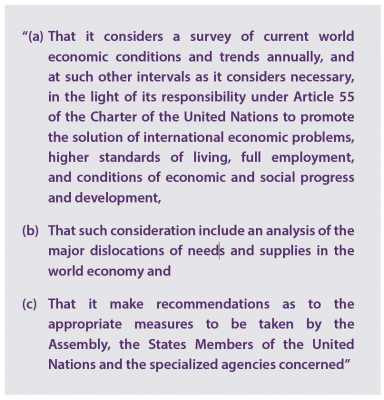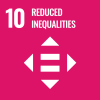
The World Economic and Social Survey 2017 reviews the relevant discussions on the global economy and development presented in WESS over the past seventy years. The objective is to bring the insights and the historical experience of development policy analysis to inform the implementation of the 2030 Agenda for Sustainable Development. This policy brief aims at presenting the evolution of the World Economic and Social Survey (WESS) in its 70 years of the publication, including its contribution to the analysis of global economic trends and development policy recommendations.
The first development-focused report
The WESS has been the earliest and continuous post-World War II development-focused report, predating any other world development report that appeared thereafter. It was born as a response to the resolution 118 (II) of 31 October 1947, in which the General Assembly recommended to the Economic and Social Council:  WESS has recorded and analysed the performance of the global economy, social development and environmental trends in order to offer analytical insights to the intergovernmental discussions on development within the United Nations, and a framework for policy decision making.
WESS has recorded and analysed the performance of the global economy, social development and environmental trends in order to offer analytical insights to the intergovernmental discussions on development within the United Nations, and a framework for policy decision making.
A development policy-driven publication
The United Nations in general and the WESS in particular have historically been aware of and concerned with the need for a more balanced development in order to cement equity, peace and prosperity in the world. The WESS was quite instrumental in providing rigorous analysis and guidelines to support the vision, objectives and global partnership necessary for effective implementation of the four UN Development Decades (1961-1970, 1971-1980, 1981-1990, and 19912000). Thereafter, its policy analysis has also served to assess key aspects of the Millennium Development Goals and, currently, contributing to the understanding and formulation of integrated economic-social-environmental policies, which are key to fulfil the 2030 Agenda for Sustainable Development.
WESS contribution to development
Over time, the WESS has undergone several incarnations in its name, format and organizational entities responsible for its publication. The first Economic Report 1945-47: Salient Features of the World Economic Situation was launched in January 1948 at Lake Success, New York. Then it adopted a shorter title, the World Economic Report (WER). After years of focusing on assessing the state of the world economy after the war, in 1955 the Survey was renamed World Economic Survey (WES). Since 1993, it has been called World Economic and Social Survey (WESS), reflecting more properly its main areas of focus. In 1999, an additional report—the World Economic Situation and Prospects (WESP)—was launched to examine short-term economic trends which allowed the WESS to become a fully-fledged report on long-term trends. The WESS in the new millennium has analysed and provided policy guidance on the links between development and ageing, climate change, technical change, urbanization and inequalities, among other themes (WESS 2007, 2009, 2011, 2013 and 2016). Between 1949 and 1957, the World Economic Report included a separate companion volume, titled Review of Economic Conditions in Africa, which became a precursor to subsequent annual reports on the economy of the continent produced by the United Nations Economic Commission for Africa. Between 1949 and 1963, the United Nations Secretariat also produced the Review of Economic Conditions in the Middle East as a supplement to the World Economic Report. These companion volumes complemented the regional surveys prepared annually by the Secretariats of the United Nations Economic Commissions for Europe, Asia and the Far East, and Latin America. Beginning with its 1953-54 issue, the World Economic Report contained an examination of longer-term international trade issues, in addition to the analysis of contemporary economic conditions. Since 1956, the Survey has included regular analysis of longer-term issues in response to the request of the Economic and Social Council (ECOSOC). According to the request contained in a resolution of August 1956, “future surveys should continue to focus attention upon longterm problems of general interest.” In 1999, UN-DESA together with UNCTAD published the World Economic Situation and Prospects (WESP) as a separate report, in response to the Secretary-General’s programme for reform in the late 1990s. WESP functioned as a year-end update of the World Economic and Social Survey (WESS) until 2004. However, since 2005, WESP emerged as the lead publication focused on the analysis of short-term economic trends and prospects. Based on the United Nations World Economic Forecasting Model , the WESP provides economic forecasts. The regional commissions (ECA, ECE, ECLAC, ESCAP, and ESCWA) have joined UN-DESA and UNCTAD in producing WESP. The Survey’s insightful analyses of longer-term issues have offered a comprehensive account of the changing paradigms in development economics, quite often questioning the dominant paradigm by providing alternative perspectives and relevant policy messages. For example, a recurring message of the Survey concerned the necessity of global cooperation in order to deal with the challenges faced by an increasingly interdependent world. As early as 1954, it noted that “an international economy among sovereign States cannot operate through controls over their actions. But an international economy can scarcely exist if countries do not coordinate their actions” (WER 1953-54, p. 16). Similarly, the Survey put forward a proposal to set up international commodity price stabilization funds, in order to help low income countries to cope with the large fluctuations in such prices. This point is currently quite relevant as commodity prices are in a downward slide following the upward swing during the early years of the 21st century. Notably, the Survey 2006 called for focusing on the real economy and warned about the over-financialization of developed economies. As a result, it foresaw the possibility of a crash that led to the Global Financial Crisis, when many other institutions failed to see such risk. The influence of the WESS and UN-DESA in general has travelled beyond the UN Secretariat headquarters. Indeed, it was the Survey’s analysis that provided the foundation for establishing many of the specialized UN agencies or new Secretariat entities. For example, the Survey 1962 and Survey 1963 addressed broad issues of trade as an instrument for economic development of the developing countries and provided critical analytical inputs for discussion at the Preparatory Committee of the United Nations Conference on Trade and Development (UNCTAD), which later became a permanent UN agency. Similarly, the focus of the 1961 issue of the Survey was industrialization and economic development, and it thus laid the analytical basis for the establishment of the United Nations Industrial Development Organization (UNIDO) in 1966.
Leading economists in the ranks of WESS/WESP
Although the authors of the WESS remained anonymous until 2007, some of the world’s leading economists contributed to them. The 60th anniversary issue (WESS 2007) informed that the Polish and Cambridge economist Michal Kalecki was the primary author of the 1948 Report. Similarly, Hans Singer, a pioneer of development economics, joined the new Economics Department of the United Nations in 1947, becoming a leading member of the team preparing the Report for several years. Notably, professors Kenneth Arrow and Lawrence R. Klein, both Nobel Prize winners in Economics, contributed to the economic modelling and forecasting capacities of the WESP. More recently, Dr. Jose Antonio Ocampo, as UN UnderSecretary General for Economic and Social Affairs (20032007) and Dr. Jomo Kwame Sundaram as Assistant Secretary General for Economic Development at UN-DESA (20052012), both winners of the Leontief Prize for Advancing the Frontiers of Economic Thought, contributed substantively to the production and publication of the WESS/WESP. Throughout its history, the Survey has benefited from the written inputs, advice and encouragement of a wide number of academic social scientists outside the United Nations system as well as economists working in other bodies within the system, including the World Bank, the International Monetary Fund, the Food and Agricultural Organization, the United Nations Conference on Trade and Development, and the UN regional commissions.
Looking forward
The policy analysis provided and knowledge accumulated in the past seventy years of the WER/WES/WESS/WESP are important points of reference for envisioning structural transformation for sustainable development. While history does not repeat itself, the policy analysis contained in the publication sheds light on the way current and past development challenges have been dealt with and the effectiveness of the policies designed to overcome them. In celebrating the 70th anniversary of the Survey, the claim made on the occasion of the 60th anniversary stays afresh: “The Survey has fulfilled its mandate of surveying economic [social and environmental] conditions, providing an analysis of the source of ‘dislocations’ and making appropriate recommendations”. The Survey’s attention to the real economy has led to its emphasis on growth, diversification, industrialization, and infrastructure development as necessary conditions for sustained progress in social development in developing countries. It has also played an important role in broadening the concept of development, extending it to cover economic, social and environmental objectives. The review of seventy years of policy analysis presented in WESS 2017 contributes to reflect on the policies and development experience in the past still relevant to advance the policy integration of economic development, social development and environmental sustainability for the successful implementation of the 2030 Agenda.
 Welcome to the United Nations
Welcome to the United Nations


